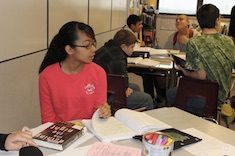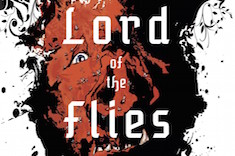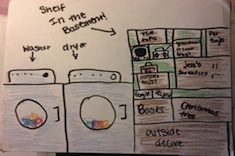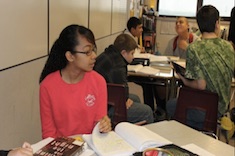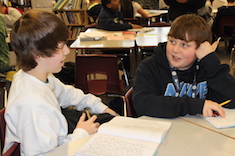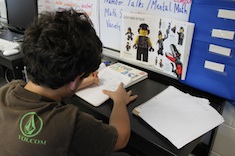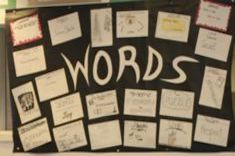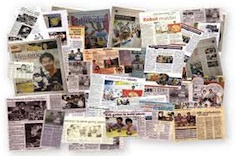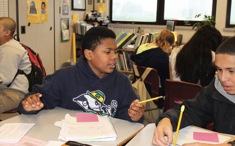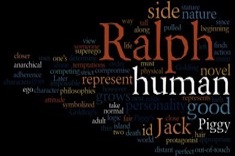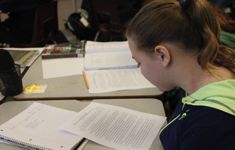9th
Latest Content
Choose Your Own Grammar Adventure
Gretchen Schroeder shares a quick exercise she’s developed for her high school students to hone grammar and editing skills using online video resources and individual Chromebooks.
Using Podcasts as an Alternative to Article of the Week
Gretchen Schroeder adapts the popular "Article of the Week" activity with podcasts as an alternative in her high school classroom, and shares some of her favorite podcasts to use with students.
Focused Revision: Introductions
Gretchen Schroeder focuses solely on revision to introductions in her high school classroom with three fun activities to teach students new possibilities for beginnings.
Writing Effective Conclusions
Anadiplosis, tricolon, syntax and such — when Gretchen Schroeder's high school students are stuck in rhetorical ruts, she teaches them some new rhetorical tricks for crafting conclusions.
Quick Vocabulary Practice and Assessment
Gretchen Schroeder finds that any vocabulary routine eventually gets stale in her high school classroom. She shares a couple of favorite options for reinvigorating word learning.
When a Book Doesn’t Work
Gretchen Schroeder is frustrated when a novel that has worked well for many years doesn’t appeal to her current high school students. Letting go of it is hard.
Humor Writing with Teens
Gretchen Schroeder develops a unit on humor writing that engages and delights her high school students.
My Five Objectives for the Start of the School Year
Gretchen Schroeder winnows many competing demands at the start of the year down to five clear objectives in her high school classroom.
Small Solutions for Big Problems with Classroom Discussions
Gretchen Schroeder shares some conversation fixes for when talk goes awry in her high school classroom.
Mentors for Process and Habits
Ruth Ayres shares some of her favorite mentors and mentor texts for developing good writing processes and habits.
Tweets in the High School Classroom
Gretchen Schroeder finds that tweets are a terrific quick assessment tool for analyzing student understanding of everything from nonfiction texts to character development in classic literature.
Amazing Race
Gretchen Schroeder uses the format of the Amazing Race television show to help her high school students master materials for final exams and get moving throughout the school for a fun break.
Getting Teens Out of Reading Ruts: The Sampler
Carly Ullmer describes the activity she’s developed for getting her middle school readers out of reading ruts by sampling different authors and genres.
The Case for the Sonnet
Gretchen Schroeder makes a case for teaching the sonnet to teenagers in the age of texts and Twitter.
Vocabulary Instruction: Where to Start?
Gretchen Schroeder looks for new ways to help high school students learn words.
Slow Down
Gretchen Schroeder has three strategies for slowing down with her high school students and savoring literacy learning.
Extended Inquiry with Article of the Week
Gretchen Schroeder finds the article of the week activity is an excellent vehicle for learning about content literacy gaps in student background knowledge and how to fill them.
Mentor Texts and Memoir Writing
Gretchen Schroeder finds one mentor text has many uses as her high school students explore memoir writing.
Invitations for Narrative Writing
Kim Campbell suggests activities and prompts to energize narrative writing with teens.
Reading Pictures in High School
Gretchen Schroeder melds famous artwork with literacy instruction in her high school classroom.
“Are We Gonna Watch the Movie?”
Gretchen Schroeder finds her high school students are always eager to see the movies related to the novels they are reading in class. Yet it rarely makes sense to show the entire film. She explains how to choose clips judiciously.
Core Memories and Gotcha Moments
Jennifer Schwanke explains why pop quizzes can be damaging to students by using a pop culture reference.
Guess Who’s Coming to Dinner?
Gretchen Schroeder finds the classic dinner party assignment is a fun way for her high school students to explore kindred spirits in literature late in the school year.
Group Composing
Gretchen Schroeder finds group composing is a fun way to build community, writing skills, and understanding of how arguments work with her high school students.
Teaching Search Skill Basics to Students
Bill Bass has advice for teaching web-based search skills to students.
Letter Writing with High School Students
Kim Campbell instills a love for a lost art in her high school students.
10 Ways to Publish Student Work
Erin Ocon compiles a list of the ways she publishes writing of her teen students.
Using Lord of the Flies to Teach Argument
Gretchen Schroeder has suggestions for using short texts and close reading to help students comprehend The Lord of the Flies.
How to Get a Book to Catch Fire
If your goal is to get teens more excited about independent reading, Gretchen Schroeder has suggestions to help.
Inform, Inspire, Instruct: Essays as Mentor Texts in High School
Kim Campbell shares her favorite nonfiction short texts to use with adolescents.
Browse Content By
Type
Category
- Assessment Tools
- Big Fresh Archives
- Booklists
- Choice Numeracy
- Classroom Design
- Common Core
- Community Building
- Conferring
- Content Literacy
- Digital Literacy
- English Language Learners
- Equity
- Family Relations
- Free Samples
- Guiding Groups
- Leadership
- Literacy Coaches
- Mentor Texts
- Minilessons
- New Teacher Mentors
- Podcasts
- Poetry
- Quote Collections
- Reading Strategies
- Self Care
- Struggling and Striving Learners
- Talking and Listening
- Teacher Study Groups
- Teaching Reading
- Teaching Writing
- Word Study and Vocabulary
Author
- Melissa Quimby
- Nawal Qarooni
- Gwen Blumberg
- Julie Cox
- The Lead Learners
- Hannah Tills
- Josie Stewart
- Ruth Metcalfe
- Mallory Messenger
- Becca Burk
- Jodie Bailey
- Vivian Chen
- Mary Brower
- Tiffany Abbott Fuller
- Stephanie Affinito
- Ruth Ayres
- Leigh Anne Eck
- Heather Fisher
- Shari Frost
- Julie Johnson
- Suzy Kaback
- Gigi McAllister
- Shirl McPhillips
- Melanie Meehan
- Cathy Mere
- Debbie Miller
- Tara Barnett and Kate Mills
- Tammy Mulligan
- Dana Murphy
- Bitsy Parks
- David Pittman
- Brenda Power
- Heather Rader
- Matt Renwick
- Mandy Robek
- Christy Rush-Levine
- Gretchen Schroeder
- Jen Schwanke
- Brian Sepe
- Katherine Sokolowski
- Stella Villalba
- Jennifer Vincent
Grade Level
Choice Literacy Membership
Articles
Get full access to all Choice Literacy article content
Videos
Get full access to all Choice Literacy video content
Courses
Access Choice Literacy course curriculum and training


